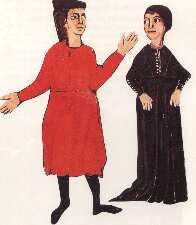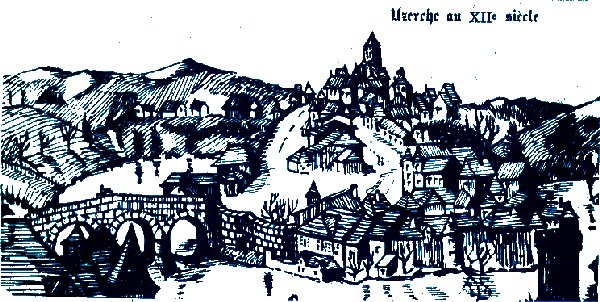Fortz chausa es
1) Fortz chaua e que tot lo major dan
e-l major dol, la! q'ieu anc mais agues,
e so don dei totztemps plaigner ploran,
m'aven a dir en chantan e retraire -
Car cel q'era de valor caps e paire
lo rics valens Richartz, reis dels Engles,
es mortz - Ai Deus! cals perd'e cals dans es!
cant estrains motz, e cant greus ad auzir!
Ben a dur cor totz hom q'o pot sofrir.
2) Mortz es lo reis, e son passat mil an
c'anc tant pros hum non fo, ni no-l vi res,
ni mais non er nulls hom del sieu semblan
tant larcs, tant rics, tant arditz, tals donaire,
q'Alixandres, lo reis qui venquent Daire,
non cre que tant dones ni tant meses,
ni anc Karles ni Artus plus valgues,
c'a tot lo mon si fetz, qui-n vol ver dir,
als us doptar et als autres grazir.
3) Meravill me del fals segle truan,
co-i pot estar savis hom ni cortes,
puois re no-i val beill dich ni faich prezan,
e doncs per que s'esfors om, pauc, ni gaire?
q'eras nos a mostrat Mortz que pot faire,
q'a un sol colp a-l meillor del mon pres,
tota l'onor, totz los gaugs, totz los bes;
e pos vezem que res no-i pot gandir,
ben deuri' hom meins doptar a morir!
4) Ai valens reis seigner, e que faran
Oimais armas ni fort tornei espes,
Ni richas cortz ni beill don aut e gran,
Pois vos no.i etz, qui n'eratz capdelaire,
Ni que faran li liurat a maltraire,
Cill que s'eran en vostre servir mes,
C'atendion que.l guizerdos vengues!
Ni que faran cill, qe.is degran aucir,
C'aviatz faitz en grand ricor venir
5) Longa ira et avol vid' auran,
E totztemps dol, q'enaissi lor es pres!
E Sarrazin, Turc, Paian e Persan,
Qe.us doptavon mais c'ome nat de maire,
Creisseran tant en orguoil lor afaire,
Qe.l Sepulcres n'er trop plus tart conques --
Mas Dieus o vol! que, s'el non o volgues,
E vos, seigner, visquessetz, ses faillir,
De Suria los avengr' a fugir.
6) Oimais no.i a esperanssa qe.i an
Reis ni princeps que cobrar lo saubes
Pero, tuich cill qu'en luoc de vos seran
Devon gardar cum fotz de pretz amaire,
Ni cal foron vostre dui valen fraire,
Lo Joves Reis e.l cortes Coms Jaufres!
Et qui en luoc remanra, de vos tres
Ben deu aver aut cor e ferm cossir
De far bos faitz e de socors chausir.
7) Ai! seigner dieus! vos q'etz vers perdonaire,
vers Dieus, vers hom, vera vida, merces!
Perdonatz li, que ops e cocha l'es,
e no gardetz, Seigner, al sieu faillir,
e membre vos cum vos anet servir!
|
|
Fortz chausa es
1) It is a very cruel event, the gratest misfortune
and the greatest sorrow, alas, that I have ever had
one which I must always lament, weeping,
that I must tell and recount in song
for he who was the head and father of valor,
the strong, the powerful Richard, king of the English,
is dead - Alas God! what a loss, what a blow!
such a harsh statement, so painful to hear,
hard of heart is any man who can endure it.
2) The King is dead, and not for a thousand years
has there been, or has anyone seen, so splendid a man,
nor was there ever a man equal to him,
so open, so powerful, so courageous, so generous
so I believe not even Alexander, the king who vanquished Darius,
gave or distributed as much as he,
nor were Charlemagne nor King Arthur more valiant
for to speak the truth, he knew
how to dominate some in this world, and to be kind to others.
3) I marvel that in this false, deceitful age
there can be any wise and courtly man,
for neither fair words nor fine deeds ensure these qualities,
and then, why should a man exert himself little or much,
when Death has shown what he can do
at one blow claiming the world's best -
all honor, all joys, all good -
and since we see that it is inescapable,
man ought not to fear dying so much.
4) Ah! noble lord, what will now become
Of arms, or hotly contested tournaments.
Rich courts or splendid, magnificent gifts,
Since you are not there, who were their guiding spirit,
And what will they do, those delivered unto suffering,
Who has placed themselves in your service,
And who were waiting for the reward to come;
And what will they do, who should kill themselves,
Whom you had brought to great power?
5) Long suffering and miserable life they will have
And endless grief, for such is their fate;
And Saracens, Turks, Pagans, and Persians,
Who dreaded you more than any man born of woman,
Will so greatly increase their arrogant attitude
That the Holy Sspulchre will be conquered much later -
But God wills it, for, if he had not wanted this,
And if you, Lord, had lived, without fail.
They would have had to flee Syria.
6) Henceforth there is no hope that they will go there
Kings and Prices who might know how to recover it!
However, all those who will be in your place
Must contemplate how you loved merit,
And who were your two valiant brothers,
The Young King and the courtly Count Geoffrey;
And he who will remain in place of you three there
Must surely have high courage and the firm will
To do fine deeds and to choose (to offer) assistance.
7) Alas, Lord god! you who are the true forgiver of sins,
true God, true man, true life - have mercy!
Pardon him, for he has need of your grace,
Lord, do not remember his sins,
but remember how he was going to serve you.
|


